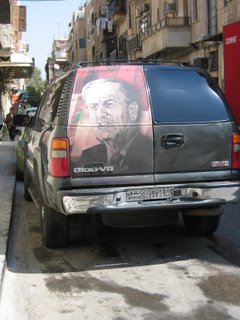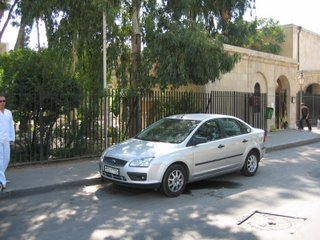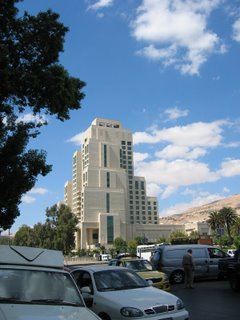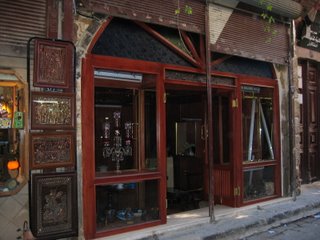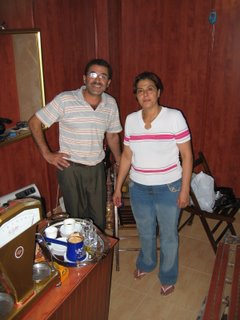Culture Shock: American Girl vs. Syrian Mother
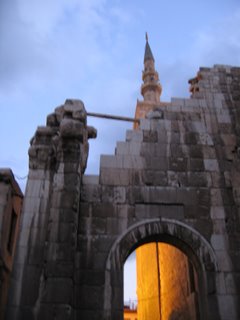 Behind the Umayyad Mosque on the second night of Ramadan. The call to prayers immediately before Iftaar (the break-fast) was sounding as this photo was taken.
Behind the Umayyad Mosque on the second night of Ramadan. The call to prayers immediately before Iftaar (the break-fast) was sounding as this photo was taken.In planning for my fieldwork here in Damascus, I decided to start with a homestay to help me get my bearings as I start my research. I thought that the benefits would outweigh any disadvantages since a homestay would automatically increase my social network and force me to participate in society rather than isolate myself in an apartment with my iPod (Creative, actually…). In any case, the homestay would only be for a few months until my husband comes and we get a private apartment together.
Little did I know how restrictive social life in the Arab world can be. Everyone worries about me, not least of all my homestay mother (not to mention my real mom back home!), as I go about my daily business walking the streets of Damascus. Here are some tidbits of our culture clash when an independent American woman faces an Arab Muslim mother:
“Lindsay, don’t stay out too late, OK? Come home before 9:30.” 9:30! That hasn’t been my curfew since Junior High. It didn’t take me long to break that rule, since I consider myself a renter and not a daughter. “Lindsay, please, not after 10:30, OK?” We’ll see how long I can last. Unfortunately, for an anthropologist, culture doesn’t stop happening at 10:30, particularly in the Arab world where midday heat makes it more convenient to nap in the afternoon and stay up late, or during Ramadan when the city only truly wakes up from a zombie-like state after Iftaar (the break-fast) around 6pm.
On visitors in the house: “Lindsay, go in your room. The plumber is here to fix the water.” “Oh, it’s OK, I don’t mind. He doesn’t bother me.” “Lindsay, go in your room! He will see you.” “Really, it’s OK, I don’t mind.” “Lindsay, in your room!”
“Lindsay, go in your room. Is OK? My in-laws are here.” “Actually, I don’t want to go in my room, but I suppose I can study.” “Mmm, OK.” Later I found out that she was protecting me from their interrogation. They think that all American Jews are spies for Israel and wanted to ask me questions about it.
On shoes and clothing in the house: “Lindsay, don’t walk around the house in white socks. They will be so hard to get clean!,” “Oh, don’t worry about it, I don’t mind if my socks aren’t white on the bottom.” “Lindsay, put slippers on!” Of course, I think I am doing enough taking my shoes off at the door as far as rules go. And I also put on the special bathroom slippers every time I have to go to the restroom, just so I won’t get castigated. “Lindsay, here are the bathroom slippers. Use them.” Secretly, I take them off as I enjoy my private moments on the toilet.
One day, immediately after I had gotten out of the shower and went into my room to get dressed, a knock on my door: “Hhhhh, Lindsay, don’t walk under the fan when you are not dressed! You’ll catch a cold!” It is 90 degrees outside. Even in the moments when you think you have privacy (i.e., putting clothes on), there is someone watching and judging.
As I hung my clothes on the patio clothesline after my first attempt at using a Syrian washing machine, “Lindsay, put your underwear on the inside line and the clothes on the outside. That way men on the street can’t see your underclothes.” We live on the seventh floor.
A few miscellaneous items:
- “You want to shower today? Again? You just showered yesterday!” Water is a scarce resource in the Middle East. Particularly after the recent Lebanon war, Syria’s water supplies are stretched to the limit with the influx of refugees and sending humanitarian aid to Lebanon.
- “Turn the hot water heater off after you shower. It is dangerous.” True, but this advice came after I had somehow successfully been turning the hot water heater off without instruction for a week.
- “Don’t go in the elevator if there is a man in it. Take the stairs.”
- “Don’t talk to the neighbors. If they ask, tell them you are a friend of the family.”
- “Lindsay, put olive oil on your yogurt. It makes it better. Why don’t you put oil on?”
- “Drink tea with your breakfast. It makes the food taste less dry.”
Perhaps some of this advice is useful, it certainly serves to socialize a child into becoming a proper member of Syrian society. But as a grown woman who is paying to have a place to stay and not to lose her freedom, it can become suffocating. No matter how many times I tell her not to worry about me, that I am responsible for myself and that I am perfectly comfortable and safe here, she will worry about me just as she worries about her own daughter’s reputation and behavior.
To be fair, though, my homestay mother has also helped me with my Arabic, my colloquial speech, in translating my interview worksheets, in providing field data (knowingly and unknowingly), and she has food for me every day. It’s a shame I haven’t been able to separate social expectations of a Syrian girl in a Muslim family from our professional relationship! Such is fieldwork: intensive, intimate, non-stop, you can’t escape. This is how we work.
